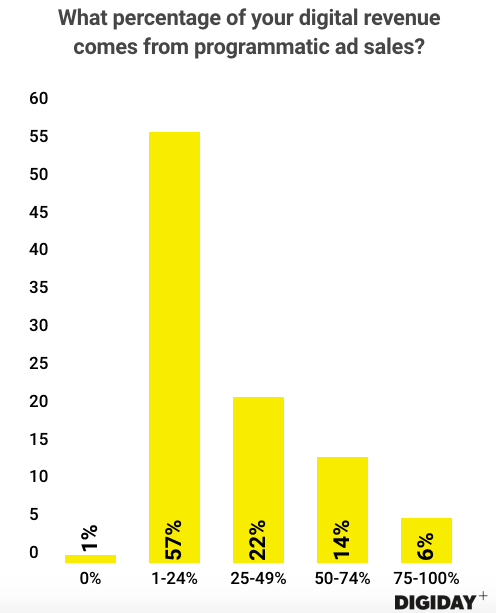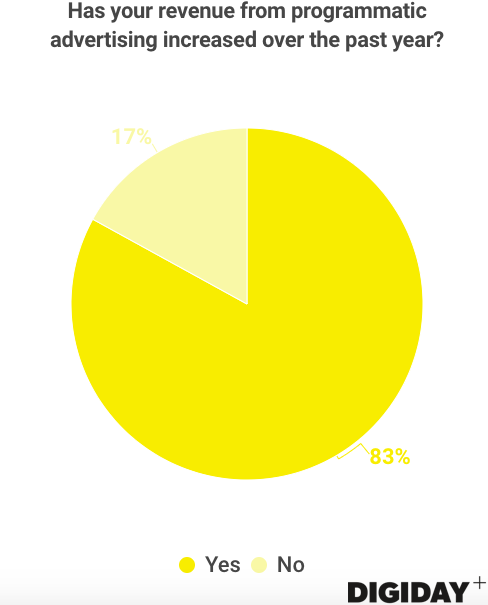Secure your place at the Digiday Media Buying Summit in Nashville, March 2-4
Digiday Research: 83 percent of European publishers increased programmatic ad revenue in 2017

This research is based on unique data collected from our proprietary audience of publisher, agency, brand and tech insiders. It’s available to Digiday+ members. More from the series →
At the Digiday Publishing Summit Europe event last month in Monaco, we sat down with over 80 European publishing executives to learn more about publishers’ reliance on programmatic advertising for their digital revenues. Check out our earlier research on brands bringing media buying in-house here. Learn more about our upcoming events here.
Quick takeaways:
- Eighty-three percent of publishers in Digiday’s survey from the event saw an increase in programmatic ad revenue in 2017.
- Only 20 percent of publishers got more than 50 percent of their digital revenues from programmatic.
Europe lags behind the U.S. when it comes to programmatic advertising. Whereas 78 percent of display spending in the U.S. was transacted programmatically in 2017, a 2017 report from the Interactive Advertising Bureau Europe found that just over 50 percent of display spending in Europe was transacted programmatically. However, Digiday research found that European publishers are increasingly adopting programmatic.
In Digiday’s survey of 84 European publisher executives, 99 percent of publishers counted on programmatic advertising for at least some part of their digital revenue.

While nearly all European publishers have adopted programmatic sales, the majority are relying on it for less than 25 percent of their digital revenues. High-profile cases of ad fraud that highlight the messiness of programmatic advertising like those of the Financial Times and News UK could easily prevent publishers from adopting it.
Publishers are well-aware of programmatic advertising’s problems with ad fraud, yet some argue little is being done to fix the digital marketplace. The Guardian, Schibsted and Axel Springer are exploring ways to work together to reduce the opacity of the programmatic landscape. “Despite fraud being derided, we’re yet to hear any real cries of zero tolerance from the middle of the market,” said Danny Spears, programmatic director at the Guardian. “Publishers need change.”
That’s not to say publishers are letting these issues restrict them from expanding their programmatic offerings. In Digiday’s survey, 83 percent of respondents reported increasing their revenue from programmatic advertising in 2017.

For 80 percent of publishers, programmatic makes up less than half of their digital revenue. But many are making significant strides to expand their programmatic capabilities. Prisa, which makes between 25 and 40 percent of its ad revenue from programmatic, switched to a server-side platform to conduct its header bidding in an effort to grow programmatic ad yields by reducing page latency.
Publishers can make adjustments outside of technology to improve their programmatic capabilities. The BBC increased its programmatic revenue after training its 100-person global sales team on its programmatic technologies, which improved its sellers’ ability to uncover audiences for buyers.
Few publishers are likely or able to follow the route of publishers like GiveMeSport, which built its own ad tech stack, duplicated its website to test various programmatic integrations live and gets 95 percent of its total revenue from programmatic advertising. In Digiday’s survey, only 6 percent of publishers relied on programmatic for more than 75 percent of their digital revenues. In an IAB Europe report released in November, roughly half of all publishers surveyed said technology costs were a major restriction to growing programmatic capabilities.
More in Media

From feeds to streets: How mega influencer Haley Baylee is diversifying beyond platform algorithms
Kalil is partnering with LinkNYC to take her social media content into the real world and the streets of NYC.

‘A brand trip’: How the creator economy showed up at this year’s Super Bowl
Super Bowl 2026 had more on-the-ground brand activations and creator participation than ever, showcasing how it’s become a massive IRL moment for the creator economy.

Media Briefing: Turning scraped content into paid assets — Amazon and Microsoft build AI marketplaces
Amazon plans an AI content marketplace to join Microsoft’s efforts and pay publishers — but it relies on AI com stop scraping for free.





